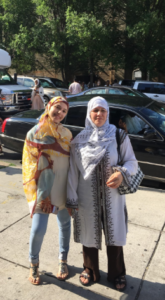Amelia Benamara
Staff Writer

Ramadan is a sacred month of fasting, thoughtfulness, and supplication for Muslims in the Islamic religion. Fasting is one of the five central standards of Islam. Every day amid Ramadan, Muslims don’t eat or drink from dawn to nightfall — in other words from Fajr to Maghrib. Fast is broken by imparting suppers to family and companions, and the finish of Ramadan is praised with a three-day celebration known as Eid al-Fitr, one of Islam’s major occasions.
This time around is an opportunity to hone poise and self-reflection. Fasting is viewed as an approach to purify the spirit and have compassion for those on the planet who are unfortunately ravenous and less blessed. Muslims, including myself, go to work and school and deal with their typical exercises amid Ramadan; in any case, some read the whole Quran, say exceptional petitions and go to mosques all the more often times during this time.
Zakat is one of the most important duties in Ramadan, the giving of donations or any funding to those who need it near you. Usually, each country has a certain amount of money a family should donate. Originally, it is an obligation to pay 2.5 percent of the wealth you have made after a full lunar year. Farmers who own their own land and harvest their own crops are required to pay 5 or 10 percent of their harvest’s worth, depending on the type of irrigation.
The Quran, the holy book Islam follows, specifically states “Zakat is for the poor, and the needy and those who are employed to administer and collect it, and the new converts, and for those who are in bondage, and in debt and service of the cause of Allah, and for the wayfarers, a duty ordained by Allah, and Allah is the All-Knowing, the Wise.”
I began fasting for Ramadan when I was eleven years old, due to the clash of puberty which is the traditional point in life when one should start fasting. Of course, like everybody else, that first was a very hard experience. It is normal to have a few days where you have to break your fast whether it is from hunger or eating by accident — these struggles I have been through my first year, but I have learned from it the best way I could. However, six years later it’s very easy for me to complete the entire 30 days due to the amount of experience.
What I love about Ramadan is not just that it’s the month of forgiveness but also a time to grow closer to family all around. I usually join my mother in the kitchen for hours to assist in preparing traditional meals for Iftar. This has allowed me to grow closer not only to the origins of the religion itself but also to my Algerian culture.
The way others around me react to this Islamic holiday is very different all around in my life so far. In middle school, I kept quiet about the fact that I was fasting. So few students participated, and many questions were asked that led to judgment by others; which is understandable because everyone was very young in age to understand fully, including me.
When I entered High School, I felt less different from others because compared to my Middle School there is a large population of Muslims at Science Leadership Academy. I find it so powerful that many do not ask relevant questions just to get laughter out of it. I do not blame anyone for this because they simply do not know the importance of this holiday and that is okay.
SLA even has a dedicated a room for prayers to be completed during school hours which I think is incredibly generous. Even the comments of “Do you want me to move?” when someone eats in front of me means a lot because it shows a simple act of care. I only hope to have similar experiences that put me at ease during this time I the future when I make it to college and have to introduce a new environment for my people to practice.
Leave a Reply